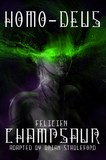Homo-Deus
NOTE: YOU ARE PURCHASING AN E-BOOK, NOT A PAPER BOOK. WHEN ORDERING, PLEASE SPECIFY IN THE COMMENTS IF YOU PREFER A PDF OR AN EPUB FILE. THE FILE WILL BE E-MAILED TO YOU AS SOON AS PAYMENT IS RECEIVED.
HOMO-DEUS
by Félicien Champsaur
adapted by Brian Stableford
cover by Yoz
Marc Vanel stepped onto the disk. Immediately, he seemed to melt, mutating into a mass of gray vapor, initially almost solidified, but which soon dissipated. Nothing remained but a darker nucleus at the center of a scarcely-perceptible halo. Marc followed the transformation in a mirror facing him. After a few minutes, he observed the complete disappearance of the mist; there was no longer anything in the mirror but the image of the black wall, with two luminous green dots, which were his eyes. He increased the current; sparks sprang forth; then the gleam of the pupils vanished. The fluid had penetrated the utmost parcels of his being, carrying the agent of complete invisibility. Now, he could come and go among other humans; no longer belonging to their world, he would be above them, powerful and terrible, like a god -- HOMO-DEUS.
Meet Dr. Marc Vanel, son of a scientist and a beautiful exotic spy, polymath, engineer, gifted with prodigious strength and intelligence, trained by the Brahmins of India. When Vanel acquires the power of invisibility, he becomes Homo-Deus, invisible but for his emerald green eyes, haunting the dreams of evil men and lovely women alike.
Felicien Champsaur's Homo-Deus (1924) is a ground-breaking novel which combines biomedical and superhero speculative fiction. It is a milestone in the evolution of the superhero, dealing with its fundamental problem: to what extent a person who can act with total impunity is likely to admit any constraints stemming from morality?
Also included in this volume are Champsaur's sequel, Kill the Old, Enjoy! (1925), a brutal but honest look at the moral disintegration of society after World War I, and an afterword by Brian Stableford.
Edited by Peter Gabbani
Contents:
Homo-Deus, le Satyre Invisible (Homo-Deus, The Invisible Satyr) (Ferenczi, 1924)
Tuez les Vieux! Jouir (Kill the Old! Enjoy!) (1925)
Introduction, Afterword and Notes by Brian Stableford.
